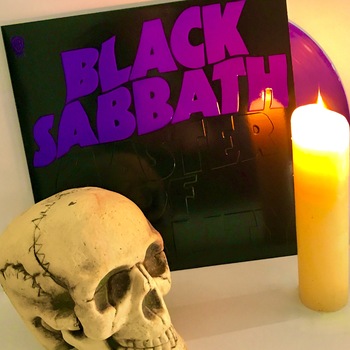MASTERS OF UNREALITY
Author: Bruce Jenkins Date Posted:24 September 2021

Returning from a tour of America in April 1971, Britain’s masters of heavy rock were bona fide stars. Although derided by music critics, their first two albums had been hugely popular with fans, who purchased them, memorised Geezer Butler’s lyrics, then came to the concerts determined to surf the sonic tidal wave of Tony Iommi’s massive riffs and Ozzy Osbourne’s armour piercing vocals. The band, four young men from working class Birmingham, revelled in the sex, drugs and rock and roll smorgasbord available to a triumphant rock band, bringing a hitherto unknown confidence to the recordings sessions for what would become Masters of Reality. They also brought home burgeoning cocaine addictions, but that’s another story.
Fascinatingly for Australian fans, 1971 had begun with Black Sabbath headlining the Myponga Music Festival in South Australia, where they first met Bon Scott, then singing with Fraternity (and later to front AC/DC). Ozzy, when asked his remembrances of Myponga in 2013, could recall little about the show. He did, however, remember getting badly sunburned in Perth on the multi-hop flight home to the UK, moaning, "I had to sit for thirty-six fucking hours in one of the old 727s in economy, fucking frying".* History doesn’t record whether the Black Sabbath singer was still smarting when the band entered Basing Street Studios in early February to start creating music for the new album.
As always, the songs were built around Iommi’s killer riffs and Geezer Butler’s often mis-understood lyrics. Having said that, there is nothing obtuse about opening track "Sweet Leaf". After the sonic signpost of an echo-laden smoker’s cough, the track explodes into action with a monolithic riff and a lyric that is clearly a love letter to dope. The guitar work is stunning, the lead riff being followed by a half-speed interlude and a brief but sparky solo. It’s a very strong opening to an exciting album.
Controversy always seemed to stand shoulder to shoulder with criticism for the Sabbs. The debut, with its undertones (or overtones, more accurately) of satanic affiliations, really stuck as a signifier for the band. So on "After Forever", Master of Reality’s second track, many picked up on the line "Would you like to see the Pope on the end of a rope — do you think he’s a fool?" as evidence of anti-Christian demonology. Which is very odd, if you read it in context. The next verse makes the pitch quite clear:
Could its be you’re afraid of what your friends might say
If they knew you believe in God above
They should realise before they criticise
That God is the only way to love.
Not exactly pentagrams, devils, and sacrificing virgins, is it? The same applies to "Children of the Grave": not an advertising pamphlet for death worshipers but a warning to young people that the only way to avoid future disaster is, you guessed it, "love".
Yet there is a darkness to the music on Master of Reality; Black Sabbath’s driving, muddy sound (due, primarily, to Tony Iommi’s tuning his guitar down to ease the pain of his mutilated fingers when playing) and Ozzy’s monotone wail will never produce shiny happy tunes. So the two instrumental fragments (one on each side of the LP) are quite refreshing to the ears.
Black Sabbath’s third album is as strong on the second side as the first. "Lord of this World" has a creepy message about selling one’s soul to the character with the horns, while the final track, "Into the Void", is a musically engaging and lyrically entertaining sci-fi epic.
If you want to immerse yourself in the foundations of heavy rock, Master of Reality and Paranoid, its predecessor, will provide a sheet metal, riff-laden, dope-hazed trip.
* Quote from Black Sabbath: Symptom of the Universe by Mick Wall [St Martin’s Press, NY, 2013]
© Bruce Jenkins 2021

